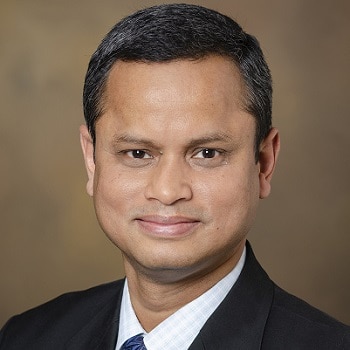Dr. Nabajit Choudhury has joined the Regional One Health team as a general surgeon.
He provides surgery for a variety of non-emergency and emergency conditions, such as hernia repair and appendix or gall bladder removal.
Dr. Choudhury’s care philosophy is to treat every patient like a member of his own family. He communicates openly and honestly to help patients decide if surgery is their best option.
When we get on an airplane, we put our lives in the pilot’s hands. Nabajit Choudhury, MBBS, MS, realizes people feel the same way when they undergo surgery – so he aims to put patients at ease by treating every individual as if they are a member of his own family.
Dr. Choudhury recently joined Regional One Health as a general surgeon. He sees patients at our downtown campus, 880 Madison Avenue; and East Campus, 6555 Quince Road.
“In medical school, I was inspired by the idea of being able to do something with my own hands to help patients fix problems,” he said. “Patients give us their trust to take care of them and to fix them. Being able to do that is a great opportunity for anyone in the medical field.”
Dr. Choudhury completed his medical degree and residency in his native India. After moving to the United States a few years ago, he completed a residency in general surgery at University of Arizona, Tucson and earned board certification from the American Board of Surgery.
As a general surgeon, he specializes in using surgery to remove disease, fix injuries and promote health and healing. That means Dr. Choudhury can help patients with a variety of conditions, including non-emergency procedures like hernia repairs and emergency conditions like appendix removal, gall bladder surgery, intestinal obstruction and many others.

“Patients give us their trust to take care of them and to fix them. Being able to do that is a great opportunity for anyone in the medical field,” says Dr. Choudhury.
For many patients, he is the next step after a primary care visit or a trip to the emergency room.
While Dr. Choudhury provides emergency surgery for acute conditions, patients often first see him for a consultation after their primary care provider refers them due to pain or other problems they are experiencing. He conducts a careful exam that includes a review of the patient’s lab work and imaging and a conversation about the problem the patient is dealing with.
“Once I talk to the patient and examine them I can match my clinical finding with the lab work,” Dr. Choudhury said. “I can tell the patient what’s going on, and either recommend surgery or suggest monitoring them to see if they improve with medication or another form of treatment.”
Surgery isn’t always the first or best option, Dr. Choudhury explained. When it is, he takes care to be open and honest with each patient about what to expect.
“I want their expectations to be realistic, so I discuss all the possible complications and what to expect from post-operation recovery,” he said.
In many cases, Dr. Choudhury said, a surgeon can make a life-changing or even lifesaving difference for patients. In others, however, surgery may not be able to completely fix the issue.
No matter what the case, Dr. Choudhury approaches each patient with empathy. “I have a very simple philosophy: With every patient I think, ‘What if he or she was my family member?’” he said. “I want my patients to be satisfied and confident in the care I’m providing.”

General surgeons specialize in using surgery to heal injuries and illnesses and promote overall health and well being.
To that end, Dr. Choudhury takes a special interest in helping patients overcome barriers to care, a skill he honed working in mobile clinics that served remote parts of India. He has also worked with patients with comorbidities and has done research on the impacts of poor access to health care.
Those experiences taught him that a big part of his job is to meet patients where they are and educate them about why regular health care is so important. He looks forward to the opportunity he has at Regional One Health to take a hands-on, personalized approach to patient care.
He is also excited for the opportunity to guide the next generation of surgeons. “I enjoy teaching medical students and residents and helping them grow and mature,” he said. “I want to make sure I train them in the correct way, because they may be taking care of me down the line.”
In his spare time, Dr. Choudhury enjoys spending time with his wife, who is a pathologist, and children, ages 10 and 5.
He also enjoys hobbies that, much like his chosen profession, let him create something positive with his own two hands. “I enjoy gardening; I grow vegetables and flowers,” he said. “I’ve also taken up woodworking. In Arizona, we were hiking in the desert and saw a few cactus skeletons. I polished them and spray-painted them, and since the inside is hollow I put in a tiny light and it became a lamp. I enjoy seeing something interesting and turning it into something new.”